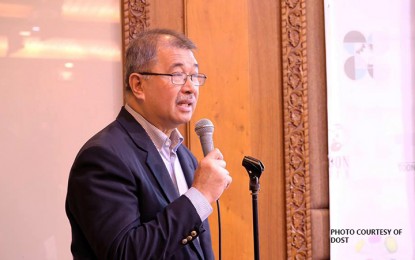
Department of Science and Technology Secretary Fortunato dela Peña (File Photo)
MANILA -- The Philippines seems to be making headway in science and technology (S&T), Department of Science and Technology (DOST) Secretary Fortunato dela Peña said.
Dela Peña was on his way to Kagoshima, Japan on Sunday to attend the scheduled launch of the Philippines' second microsatellite called "Diwata 2," which can be used to gather information about disasters, among others.
"Diwata-2" was set to be launched at the Tanegashima Space Center on Monday.
In a text message to the Philippine News Agency (PNA) on his way to Japan on Sunday, dela Peña also enumerated other recent vital developments in the country's S&T sector.
"Our Balik Scientist Act is now in effect. I signed the IRR (implementing rules and regulations) last Oct. 4, and it took effect on Oct. 21," he said.
President Rodrigo Duterte signed the Balik Scientist Act into law last June. The law seeks to provide incentives to Balik Scientists, or S&T experts residing abroad and who are contracted to return to the Philippines to work and use their expertise in the country.
Dela Peña said institutionalizing the Balik Scientist Program would encourage more Balik Scientists, since the new law allows them to process their visa and immigration requirements faster.
Host institutions for Balik Scientists could be local or private institutions seeking technical assistance.
Dela Peña said some host universities are grateful for the huge help of the Balik Scientists, especially in the fields of robotics, pharmaceuticals, and drug development.
"The UST Dean of Pharmacy, for instance, told me that their initial engagement with a Balik Scientist significantly improved their R&D (research and development) program and plans. The president of Southern Leyte State University said likewise," dela Peña added.
He said some host universities are having difficulty bringing in a Balik Scientist. He cited, for instance, the University of Mindanao in North Cotabato, where there were reported incidents of war between soldiers and the leftist group New People's Army.
Dela Peña is eyeing to get 60 Balik Scientists per year after the Balik Scientists Program has become a law.
Another S&T development that he mentioned was the recently concluded ASEAN Science Ministers' meeting that he chaired in Cebu City.
Dela Pena said among the accomplishments of the ASEAN meeting was that the ministers have agreed to the creation of new S&T centers and networks in the region.
An ASEAN Center for Microbial Utilization will be established in Thailand, he said, adding that the ASEAN Network for Diagnostic Initiatives will be led by the Philippines.
The Philippines and other member states have also agreed to invest more in science, technology, and innovation, he added.
"(It was also during the ministers' meeting) that a Filipina was given the US ASEAN Award for Outstanding Woman Scientist," he said.
Dela Peña was referring to Dr. Gay Jane Perez, who has been extensively involved in DOST's space technology development program.
The DOST chief said Perez bested 45 other nominees from the region. (PNA)
